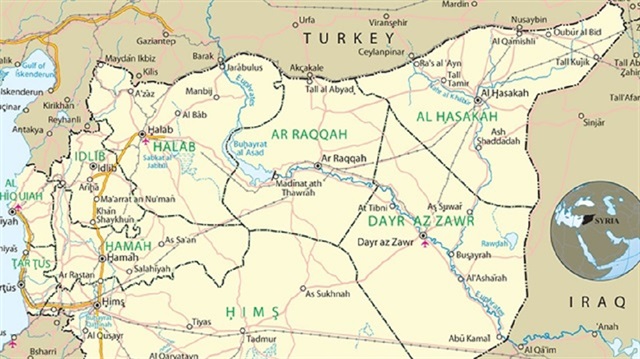
Attempts by PKK terrorists to seize control over the two biggest operation border crossings of Bab al-Salamah and Bab al-Hawa are ongoing
The Syrian map has drastically changed since the end of 2016 after the Syrian opposition lost swaths of land to the regime, and the regions previously controlled by Daesh were handed over to the Syrian affiliate of the Kurdistan Workers’ Party (PKK), the PYD, which, backed by the U.S., has established control over areas in Hasakah, Deir Ez-Zor, Raqqa, Jarabulus and Aleppo.
U.S.-backed PKK terrorists currently occupy 580 kilometers of Syria’s border regions, which include the Syrian side of the border crossings of İslahiye, Mürşitpınar, Akçakale, Ceylanpınar and Şenyurt, as part of the multilateral plan to besiege Turkey from the south through Iraq and Syria.
Attempts by PKK terrorists to seize control over the two biggest operation border crossings of Bab al-Salamah and Bab al-Hawa are ongoing.
PKK terrorists are currently stationed 2.5 kilometers from Azaz’s Bab al-Salama border crossing and at a distance of 13 kilometers from the Reyhanlı- Bab al-Hawa gate.
The U.S.- PYD alliance has prioritized its goal of seizing control over the biggest operational border crossings with Turkey as PKK terrorists continue to target Bab al-Hawa and Bab al-Salamah with mortars and missiles.
A total of nine border crossings have been established on Turkey’s border with Syria, which stretches 911 kilometers from the Mediterranean in the west to the Iraqi borders in the east.
Two of the largest border crossings are located on the borders of the southern Turkish provinces of Hatay and Kilis, where the Cilvegözü and Öncüpınar border crossings are found, which are currently operational and are manned by the opposition on the Syrian side.
Five border crossings are located in areas that are currently occupied by PKK terrorists, and the Kasab border gate to the west is currently under regime control.
The Syrian opposition regained control over the Jarabulus border crossing following the launch of the Euphrates Shield Operation in August 2016, which cleared the region from the presence of Daesh terrorists.
PKK terrorists, who occupy approximately 600 kilometers of the border with Turkey, are trafficking humans and smuggling weapons and fuel across the border through underground tunnels they dug in close vicinity to border gates.
The tunnels also serve as a passageway for foreign terrorists from Europe and Turkey as they cross into Syria to receive training in terror camps established in PKK-occupied regions.
Until 2016, a large number of foreign fighters who fought alongside PKK terrorists received training in camps set up in the PKK-occupied cities of Ayn al-Arab, Qamishli and Afrin.
The PKK is listed as a terrorist organization by Turkey, the European Union and the United States.
The PKK has been conducting armed violence in the southeastern part of Turkey since 1984. More than 40,000 people, mostly civilians, have been killed in the three-decade long conflict.





